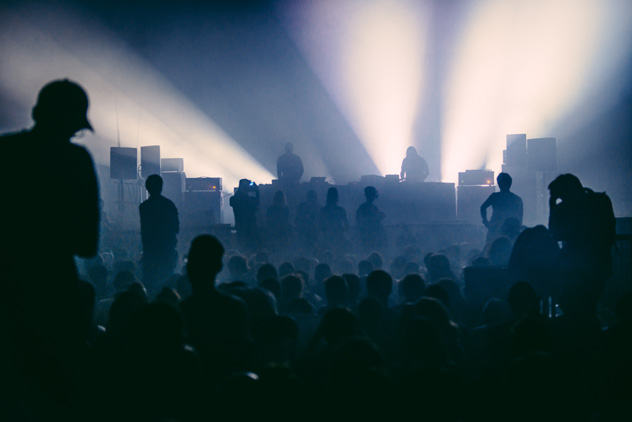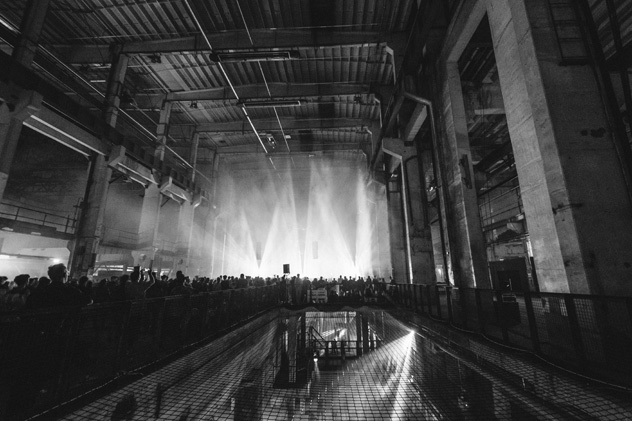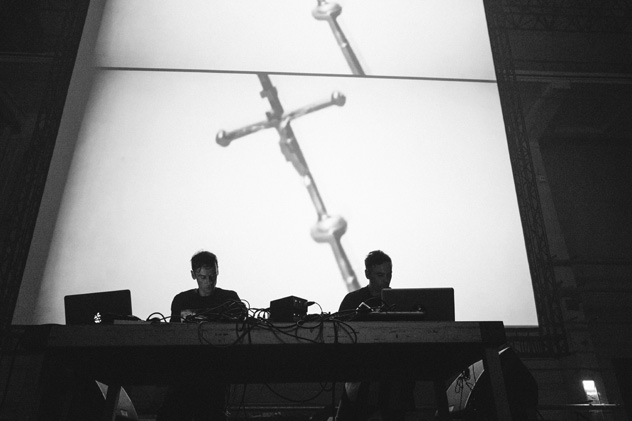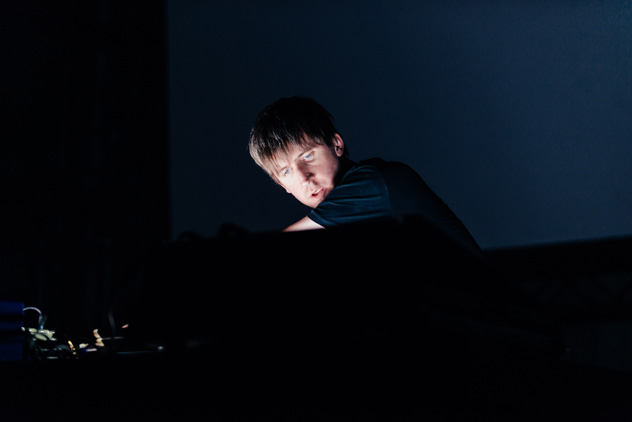- "All of a sudden, noise was music." This is how Tresor founder Dimitri Hegemann explained the influence of Berlin Atonal on West Berlin's music scene in the '80s. Hegemann ran Atonal throughout that decade before opening Tresor in 1990. 23 years after its final edition, Atonal sprang back to life in 2013 at Kraftwerk Berlin, an enormous industrial space in the same building as Tresor's current location. This year was Atonal's third edition since its reboot. As in years past, the five-day programme ran the gamut from avant-garde electronics to dance floor techno.
Though much of the programming pushed Kraftwerk's soundsystem to its limit, the opening night gave it a rest. Barbara Morgenstern and Philipp Neumann's Chor Der Kulturen Der Welt featured only the unmic'd voices of a few dozen singers moving through the crowd. By the time Max Loderbauer and Jacek Sienkiewicz took the stage an hour or so later, the levels had ratcheted up considerably. Their set was one of the great surprises of the festival, consisting of heavy, grinding and thrillingly loud drones. Alessandro Cortini and Lawrence English's Immediate Horizon piece came next. Though it worked with similar soundscapes, the context was drastically different. Before the piece, a message flashed above the duo urging the audience to take a seat on the floor or even lie down. Nearly everyone had complied, and it wasn't hard to see why—the duo's soundscapes were abrasive but impressively soothing.
 Paul Jebanasam and Tarik Barri's Continuum show was sonically impressive but visually astounding, playing on the giant screen's negative space by showing what looked like flames burning through the screen or flashing light on some vast universe. Varg's Ivory Towers performance took a vastly different approach with the same screen, flashing sumptuous shots of wheat fields, airports and an anonymous woman's inscrutable expressions, all of which felt imbued with unknowable meaning.
On Thursday, Loderbauer played an unannounced set on a modular synth that had been installed in Kraftwerk's former control room. He spent hours building a patch until the synth was bubbling and hissing for the dozen or so people who'd found the space. Loderbauer alternated between purposeful tinkering in front of the synth with his back to the small crowd and retreating to the sidelines to take in his creation. This intimate performance was easily one of the festival's best.
Paul Jebanasam and Tarik Barri's Continuum show was sonically impressive but visually astounding, playing on the giant screen's negative space by showing what looked like flames burning through the screen or flashing light on some vast universe. Varg's Ivory Towers performance took a vastly different approach with the same screen, flashing sumptuous shots of wheat fields, airports and an anonymous woman's inscrutable expressions, all of which felt imbued with unknowable meaning.
On Thursday, Loderbauer played an unannounced set on a modular synth that had been installed in Kraftwerk's former control room. He spent hours building a patch until the synth was bubbling and hissing for the dozen or so people who'd found the space. Loderbauer alternated between purposeful tinkering in front of the synth with his back to the small crowd and retreating to the sidelines to take in his creation. This intimate performance was easily one of the festival's best.
 For many, Friday night began with a live set from Powell in Kraftwerk's main room. If you've heard his productions, it's not hard to imagine what he sounds like in a club setting. Frantic drums and bellowing, sampled vocals are the main focus, with the former booming out like a wall of sound at the performance's heaviest points. Regis and Ancient Methods stepped up as Ugandan Methods after Powell, running through similarly tough EBM- and industrial-tinged techno. Layers of static and droning synths made the set satisfyingly trippy.
Things moved downstairs to Stage Null once Ugandan Methods finished. A crew representing Stockholm label Northern Electronics were in control of the night's second half, which began at 1 AM. Dense, contemplative sets from Acronym, label boss Abdulla Rashim as Lundin Oil and Varg (who was joined on-stage by Damien Dubrovnik) didn't offer up any dance floor-friendly material, but the mood in the room throughout the night was very much upbeat.
For many, Friday night began with a live set from Powell in Kraftwerk's main room. If you've heard his productions, it's not hard to imagine what he sounds like in a club setting. Frantic drums and bellowing, sampled vocals are the main focus, with the former booming out like a wall of sound at the performance's heaviest points. Regis and Ancient Methods stepped up as Ugandan Methods after Powell, running through similarly tough EBM- and industrial-tinged techno. Layers of static and droning synths made the set satisfyingly trippy.
Things moved downstairs to Stage Null once Ugandan Methods finished. A crew representing Stockholm label Northern Electronics were in control of the night's second half, which began at 1 AM. Dense, contemplative sets from Acronym, label boss Abdulla Rashim as Lundin Oil and Varg (who was joined on-stage by Damien Dubrovnik) didn't offer up any dance floor-friendly material, but the mood in the room throughout the night was very much upbeat.
 On Saturday, Shackleton debuted his aptly named Powerplant project. A four-piece outfit armed with various kinds of percussion led the dark, tribal workout, shifting the emphasis from the audio to their theatrical movements—a difficult feat considering the overpowering sound in the room. At this point many in the audience were, at most, swaying in a trance. Some had even brought chairs to sit in for the show. This all changed when Shed took the stage. His live set was was a tour through his back catalogue, and once he'd hit his stride, the crowd was firmly in a heads-down-and-dance mood.
Many Atonal attendees would eventually move downstairs to Tresor for a techno-heavy club session. Soon after his live A/V performance on the main stage, Regis dished out a barrage of what sounded like unreleased material from the Tresor DJ booth, keeping a calm and cool demeanour as he delivered a high-energy workout.
On Saturday, Shackleton debuted his aptly named Powerplant project. A four-piece outfit armed with various kinds of percussion led the dark, tribal workout, shifting the emphasis from the audio to their theatrical movements—a difficult feat considering the overpowering sound in the room. At this point many in the audience were, at most, swaying in a trance. Some had even brought chairs to sit in for the show. This all changed when Shed took the stage. His live set was was a tour through his back catalogue, and once he'd hit his stride, the crowd was firmly in a heads-down-and-dance mood.
Many Atonal attendees would eventually move downstairs to Tresor for a techno-heavy club session. Soon after his live A/V performance on the main stage, Regis dished out a barrage of what sounded like unreleased material from the Tresor DJ booth, keeping a calm and cool demeanour as he delivered a high-energy workout.
 The festival drew to a close on the Sunday with a classy performance from festival favourite Samuel Kerridge. The Contort label head utilised the room's unique acoustics to create an experience that was at once explosive and utterly immersive.
Atonal is a festival that has to be seen (and heard) to be fully comprehended. Pushing boundaries of both music and culture has been an underlying value of the festival since it launched in West Berlin some three decades ago. Based on this year's
event, it's obvious those ideals are as strong as ever.
Photo credit: Camille Blake
Jordan Rothlein and Matt Unicomb contributed to this piece
The festival drew to a close on the Sunday with a classy performance from festival favourite Samuel Kerridge. The Contort label head utilised the room's unique acoustics to create an experience that was at once explosive and utterly immersive.
Atonal is a festival that has to be seen (and heard) to be fully comprehended. Pushing boundaries of both music and culture has been an underlying value of the festival since it launched in West Berlin some three decades ago. Based on this year's
event, it's obvious those ideals are as strong as ever.
Photo credit: Camille Blake
Jordan Rothlein and Matt Unicomb contributed to this piece
 Paul Jebanasam and Tarik Barri's Continuum show was sonically impressive but visually astounding, playing on the giant screen's negative space by showing what looked like flames burning through the screen or flashing light on some vast universe. Varg's Ivory Towers performance took a vastly different approach with the same screen, flashing sumptuous shots of wheat fields, airports and an anonymous woman's inscrutable expressions, all of which felt imbued with unknowable meaning.
On Thursday, Loderbauer played an unannounced set on a modular synth that had been installed in Kraftwerk's former control room. He spent hours building a patch until the synth was bubbling and hissing for the dozen or so people who'd found the space. Loderbauer alternated between purposeful tinkering in front of the synth with his back to the small crowd and retreating to the sidelines to take in his creation. This intimate performance was easily one of the festival's best.
Paul Jebanasam and Tarik Barri's Continuum show was sonically impressive but visually astounding, playing on the giant screen's negative space by showing what looked like flames burning through the screen or flashing light on some vast universe. Varg's Ivory Towers performance took a vastly different approach with the same screen, flashing sumptuous shots of wheat fields, airports and an anonymous woman's inscrutable expressions, all of which felt imbued with unknowable meaning.
On Thursday, Loderbauer played an unannounced set on a modular synth that had been installed in Kraftwerk's former control room. He spent hours building a patch until the synth was bubbling and hissing for the dozen or so people who'd found the space. Loderbauer alternated between purposeful tinkering in front of the synth with his back to the small crowd and retreating to the sidelines to take in his creation. This intimate performance was easily one of the festival's best.
 For many, Friday night began with a live set from Powell in Kraftwerk's main room. If you've heard his productions, it's not hard to imagine what he sounds like in a club setting. Frantic drums and bellowing, sampled vocals are the main focus, with the former booming out like a wall of sound at the performance's heaviest points. Regis and Ancient Methods stepped up as Ugandan Methods after Powell, running through similarly tough EBM- and industrial-tinged techno. Layers of static and droning synths made the set satisfyingly trippy.
Things moved downstairs to Stage Null once Ugandan Methods finished. A crew representing Stockholm label Northern Electronics were in control of the night's second half, which began at 1 AM. Dense, contemplative sets from Acronym, label boss Abdulla Rashim as Lundin Oil and Varg (who was joined on-stage by Damien Dubrovnik) didn't offer up any dance floor-friendly material, but the mood in the room throughout the night was very much upbeat.
For many, Friday night began with a live set from Powell in Kraftwerk's main room. If you've heard his productions, it's not hard to imagine what he sounds like in a club setting. Frantic drums and bellowing, sampled vocals are the main focus, with the former booming out like a wall of sound at the performance's heaviest points. Regis and Ancient Methods stepped up as Ugandan Methods after Powell, running through similarly tough EBM- and industrial-tinged techno. Layers of static and droning synths made the set satisfyingly trippy.
Things moved downstairs to Stage Null once Ugandan Methods finished. A crew representing Stockholm label Northern Electronics were in control of the night's second half, which began at 1 AM. Dense, contemplative sets from Acronym, label boss Abdulla Rashim as Lundin Oil and Varg (who was joined on-stage by Damien Dubrovnik) didn't offer up any dance floor-friendly material, but the mood in the room throughout the night was very much upbeat.
 On Saturday, Shackleton debuted his aptly named Powerplant project. A four-piece outfit armed with various kinds of percussion led the dark, tribal workout, shifting the emphasis from the audio to their theatrical movements—a difficult feat considering the overpowering sound in the room. At this point many in the audience were, at most, swaying in a trance. Some had even brought chairs to sit in for the show. This all changed when Shed took the stage. His live set was was a tour through his back catalogue, and once he'd hit his stride, the crowd was firmly in a heads-down-and-dance mood.
Many Atonal attendees would eventually move downstairs to Tresor for a techno-heavy club session. Soon after his live A/V performance on the main stage, Regis dished out a barrage of what sounded like unreleased material from the Tresor DJ booth, keeping a calm and cool demeanour as he delivered a high-energy workout.
On Saturday, Shackleton debuted his aptly named Powerplant project. A four-piece outfit armed with various kinds of percussion led the dark, tribal workout, shifting the emphasis from the audio to their theatrical movements—a difficult feat considering the overpowering sound in the room. At this point many in the audience were, at most, swaying in a trance. Some had even brought chairs to sit in for the show. This all changed when Shed took the stage. His live set was was a tour through his back catalogue, and once he'd hit his stride, the crowd was firmly in a heads-down-and-dance mood.
Many Atonal attendees would eventually move downstairs to Tresor for a techno-heavy club session. Soon after his live A/V performance on the main stage, Regis dished out a barrage of what sounded like unreleased material from the Tresor DJ booth, keeping a calm and cool demeanour as he delivered a high-energy workout.
 The festival drew to a close on the Sunday with a classy performance from festival favourite Samuel Kerridge. The Contort label head utilised the room's unique acoustics to create an experience that was at once explosive and utterly immersive.
Atonal is a festival that has to be seen (and heard) to be fully comprehended. Pushing boundaries of both music and culture has been an underlying value of the festival since it launched in West Berlin some three decades ago. Based on this year's
event, it's obvious those ideals are as strong as ever.
Photo credit: Camille Blake
Jordan Rothlein and Matt Unicomb contributed to this piece
The festival drew to a close on the Sunday with a classy performance from festival favourite Samuel Kerridge. The Contort label head utilised the room's unique acoustics to create an experience that was at once explosive and utterly immersive.
Atonal is a festival that has to be seen (and heard) to be fully comprehended. Pushing boundaries of both music and culture has been an underlying value of the festival since it launched in West Berlin some three decades ago. Based on this year's
event, it's obvious those ideals are as strong as ever.
Photo credit: Camille Blake
Jordan Rothlein and Matt Unicomb contributed to this piece